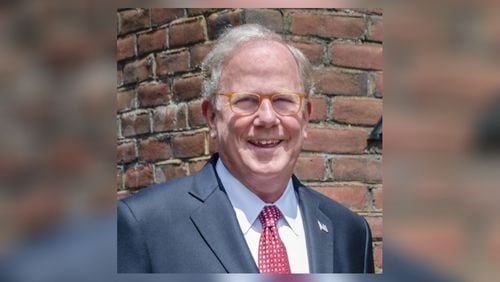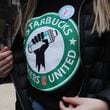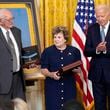In the heart of Atlanta, where concrete sprawl and bustling streets have long dominated, the legacy of Sam Friedman pedals on. Literally.
Walking and bicycle trails wind and weave for more than 300 miles through the city and beyond.
They owe their existence to the vision and determination of Friedman and a group of other longtime Atlantans who in 1991 recognized a void in the city’s amenities: a lack of trails for walking, running, peddling and pulling communities together.
They created the PATH Foundation, with Friedman at the helm as founding chairman. This visionary initiative would help grow a network that includes the Silver Comet Trail and trails along the Atlanta Beltline, drawing millions of users annually.
Friedman’s son and one-time business partner said his father “knew that beginning vision would eventually transform the city.
“He always knew the potential of it,” Geoffrey Friedman said. “And he knew it would take a long time.”
Samuel Gregory Friedman Jr., a longtime Atlanta real estate broker, civic leader, and one of the architects of the 300-plus-miles of walking and biking trails crisscrossing the region and Georgia died Wednesday, Jan. 3, at his home on St. Simons Island. He was 83.
A memorial service will be on Jan. 17 at 2 p.m. at Northside Church, 2799 Northside Drive, NW, Atlanta.
Greta G. deMayor, executive director of the PATH Foundation, said Friedman “will always be remembered as one who tried — and succeeded — to have a positive impact on the city of Atlanta and its citizens.
“His legacy will not be forgotten,” she said.
Sam Williams, former president of the Metro Atlanta Chamber of Commerce, said Friedman was “a very active civic volunteer that represented the real estate community on so many issues that involved improving the city.
“I just can’t remember all of them. There were so many,” he said.
Friedman was active in the Atlanta Union Mission’s work with the homeless and advocated for major reforms to the Atlanta Housing Authority, during his tenure as its chairman.
Friedman would approach executives of companies that were moving to Atlanta and educate them about the city and its cultural history, Williams said.
Friedman’s favorite saying was: “It’s not good enough just to make a lot of money. You’ve also got to make a big contribution to the city.
“Coming from a real estate broker, that was an unusual thing,” Williams said.
On a bike excursion out west in 1991, Friedman and two other Atlantans came to the conclusion that Atlanta needed some bike trails. When they returned, they learned three other well-connected cyclists had reached the same conclusion and were already strategizing how to develop trails before the 1996 Summer Olympics.
Friedman offered his support. Working closely with fellow biker and project devotee Ed McBrayer, he ended up hand-picking the PATH Foundation’s first board and serving as its first chairman.
“He was very proud of the board they put together and their ability to raise money and get things done,” Geoffrey Friedman said. “It wasn’t all business people. It was forward-thinking people who care about Atlanta and the quality of life in Atlanta.”
Jim Kennedy, a major benefactor of the PATH Foundation, said Friedman “was one of those guys who would not want credit, which is one of the reasons he was successful.”
“In the early days, we didn’t have much but a lot of enthusiasm,” said Kennedy, chairman emeritus of Cox Enterprises — which owns The Atlanta Journal-Constitution — and chairman of the James M. Cox Foundation. “Sam was the guy that put it all together and made it a reality.”
He said Friedman “was politically astute enough to know that there were political decisions every time we went to build something and helped us navigate through it.
“He had a singleness of purpose. We didn’t get off on a lot of tangents and just forged ahead,” Kennedy said. “I’m not sure we would have survived without his leadership in the early years.”
Born in San Juan, Puerto Rico, on April 22, 1940, Friedman was sent to the United States in 1955 by his mother, who put a premium on education, to attend Phillips Academy in Andover, Massachusetts. He attended Brown University on a full scholarship. He worked in New York before moving to Atlanta, where he joined Amoco Oil Company and received his Master’s degree in business from Georgia State University. He also worked as an adjunct professor of real estate at Georgia State, which awakened his interest in the real-estate career that had been his father’s as well, his family said.
In 2015, Friedman revealed he had been living with lupus, a chronic autoimmune disease since he was 19 and had been misdiagnosed for years. He opened up about it because he wanted to help raise $170,000 for the Georgia Chapter of the Lupus Foundation of America and to let people who have lupus know they can continue to live rewarding lives.
He was in his mid-70s at the time and deeply involved in the community with the PATH Foundation and other civic organizations.
He was a longtime member of the board of the Atlanta Kiwanis Club, which, shortly before his death, awarded him the organization’s highest honor, the Kiwanis Golden Rule Award. He chaired its USO committee and spent many Saturdays greeting military men and women for years as they passed through the Atlanta airport, his wife, Susan, said.
He was a founding director of the National Infantry Museum in Columbus, Georgia, and was awarded the Order of Saint Maurice Award, the highest U.S. Army honor presented to a civilian.
Daughter Tamara Stanton said he was so proud of the trail system.
“He got everybody T-shirts,” she said.
And he used it himself, regularly, as do all his family members, Stanton said.
“He just loved it. He thought it was a great thing for Atlanta,” she said. “He loved the city, and he wanted to make it better.”
Son Geoffrey, who worked beside Friedman in real estate for 20 years, said, “Dad lived by example.
“He was the most principled person I have ever met in my life. There was nobody I ever knew who held more firmly to their beliefs than he did, even to his own detriment.”
He is survived by his second wife, Susan, and the five children of their blended marriage: Tamara F. Stanton (Michael), Geoffrey T. Friedman (Hope), Katherine J. Bennett (Brett), John W. Howe, and Joel A. Howe (Katie); and many grandchildren.
In lieu of flowers, donations can be made to the Northside Church and to the PATH Foundation.







